Hiring a top-notch graphic designer can be a game-changer for your company's visual branding and marketing efforts. However, many recruiters stumble when it comes to identifying the right blend of creative talent and technical skills. The key is to look beyond just an impressive portfolio and assess candidates' ability to translate business objectives into compelling visual narratives.
This comprehensive guide will walk you through the process of hiring a stellar graphic designer, from defining your needs to conducting effective interviews. We'll also explore pre-employment screening tests that can help you evaluate candidates' skills objectively.
Table of contents
Why Hire a Graphic Designer?
Hiring a graphic designer can solve visual communication challenges in your business. For example, you might need eye-catching marketing materials, a fresh brand identity, or user-friendly interface designs for your digital products.
A skilled graphic designer can help with:
- Creating consistent visual branding across all platforms
- Designing engaging social media content and ads
- Developing infographics to simplify complex information
Consider hiring a full-time graphic designer if you have ongoing design needs. For occasional projects, working with a freelancer or design agency might be more cost-effective. Assess your design requirements to make the best decision for your business.
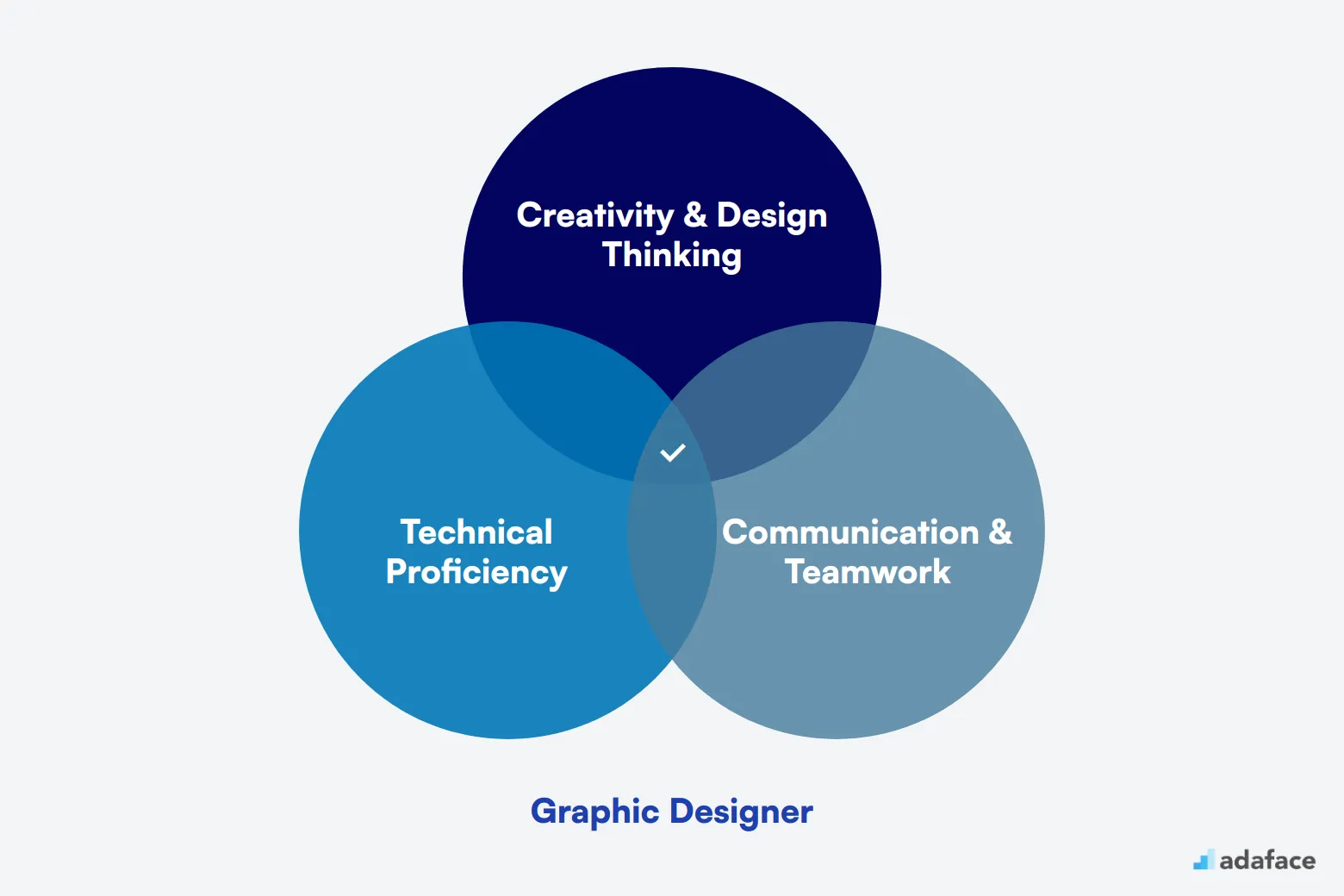
Key Skills and Qualifications for Hiring a Graphic Designer
When hiring a graphic designer, defining the right candidate profile can be challenging. What one company views as essential might only be a preference for another. It’s important to clearly differentiate between what's required and what's preferred to avoid mismatches during the hiring process.
To help you navigate this, here’s a breakdown of the must-have skills and qualifications alongside those that could enhance a candidate's profile:
Required Skills and Qualifications:
- Bachelor’s degree in graphic design or related field
- Proficiency in Adobe Creative Suite (Photoshop, Illustrator, InDesign)
- Strong portfolio showcasing design skills and creativity
- Excellent communication and time management skills
- Attention to detail and ability to follow brand guidelines
- Preferred Skills and Qualifications:
- Experience with web design and basic HTML/CSS knowledge
- Familiarity with video editing software
- Experience in a collaborative, team-oriented environment
- Knowledge of UI/UX best practices
- Experience with digital marketing tools and platforms
| Required skills and qualifications | Preferred skills and qualifications |
|---|---|
| Bachelor’s degree in graphic design or related field | Experience with web design and basic HTML/CSS knowledge |
| Proficiency in Adobe Creative Suite (Photoshop, Illustrator, InDesign) | Familiarity with video editing software |
| Strong portfolio showcasing design skills and creativity | Experience in a collaborative, team-oriented environment |
| Excellent communication and time management skills | Knowledge of UI/UX best practices |
| Attention to detail and ability to follow brand guidelines | Experience with digital marketing tools and platforms |
How to Craft an Effective Graphic Designer Job Description
Once you have a clear candidate profile in mind, the next step is to capture that information in a job description to attract the right graphic designers. A well-written job description is your first chance to make a great impression.
- Highlight key responsibilities and impact: Specify the core duties such as creating visual concepts, using software like Adobe Creative Suite, and translating brand messages into engaging graphics. Emphasize how the designer’s work will influence the company's visual identity and brand growth.
- Balance technical skills with creativity: While proficiency in design tools is necessary, also highlight the importance of creativity, problem-solving, and attention to detail. Mention how these skills contribute to the completion of innovative projects.
- Showcase your company and role’s unique selling points: Highlight what sets your company apart, whether it's working with top brands, providing opportunities for continued learning, or having a collaborative team culture. These details can attract passionate and skilled designers.
For more insights on crafting a job description, explore our graphic designer job description page.
Top Platforms to Find Graphic Designers
Now that you have a well-crafted job description, it's time to list it on job platforms to attract potential candidates. There are numerous websites where you can find talented graphic designers, each catering to different hiring needs and project types.
Upwork
Great for hiring freelancers on a project basis. Offers a wide range of graphic designers with varied experience levels.

Fiverr
Ideal for quick-turnaround freelance projects. Allows you to hire graphic designers based on specific tasks or gigs.
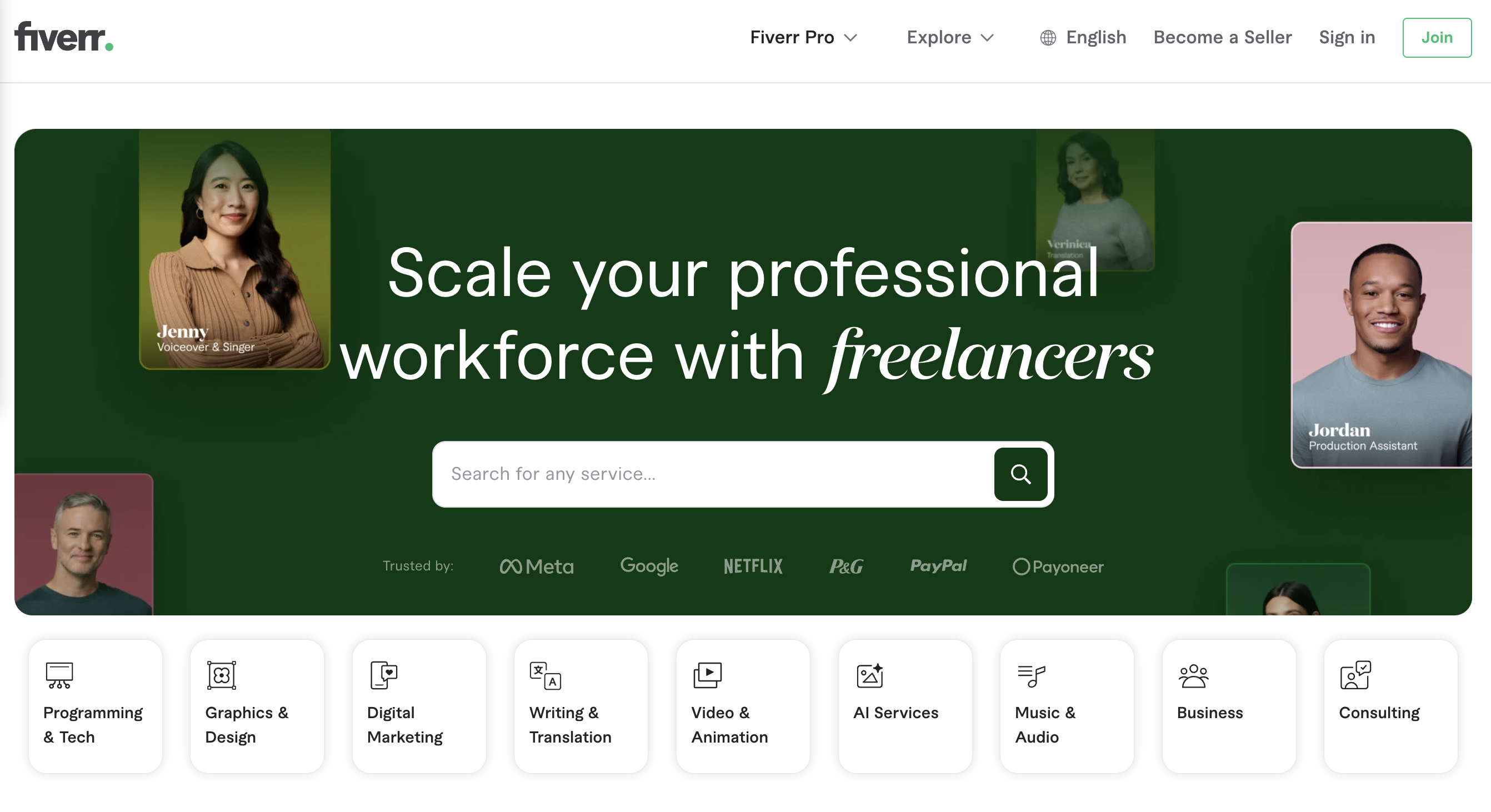
Dribbble
Perfect for remote hires. Dribbble is a community for showcasing design portfolios, great for finding talented graphic designers.
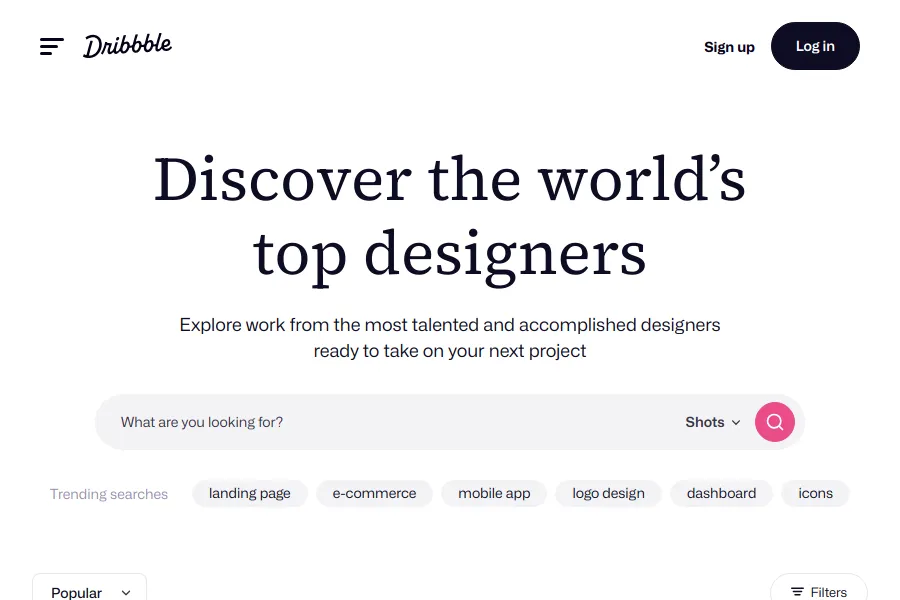
Other notable platforms include LinkedIn and Indeed for full-time positions, We Work Remotely for remote hires, AngelList for startups, and Creative Circle for part-time or project-based designers. These platforms offer diverse pools of talent, allowing you to find the right fit for your specific graphic design needs.
Keywords to Look for in Graphic Designer Resumes
Resume screening helps you quickly identify promising graphic designer candidates from a large applicant pool. It's a time-saver that lets you focus on the most qualified individuals for the next steps in your hiring process.
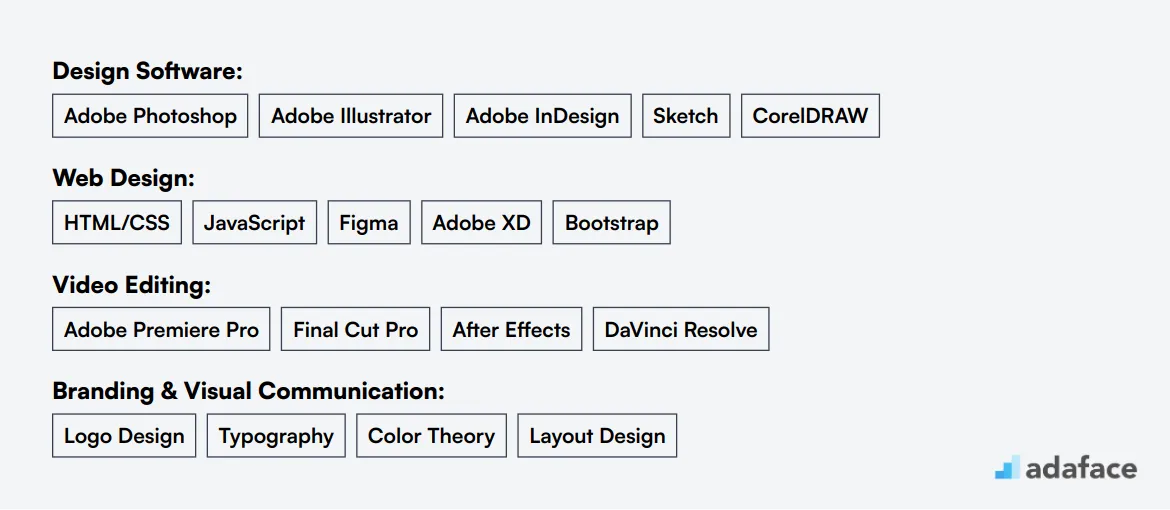
When manually screening resumes, look for key skills like proficiency in Adobe Creative Suite (Photoshop, Illustrator, InDesign), strong portfolio examples, and relevant educational background. Pay attention to experience with branding, typography, and layout design. These keywords indicate a candidate's technical abilities and creative potential.
Alternatively, you can use AI-powered tools to streamline the screening process. These tools can quickly analyze resumes against your job requirements, saving you time and ensuring consistency. You can customize the AI to look for specific skills, experiences, and qualifications relevant to your graphic designer role.
Here's a sample prompt for AI-assisted resume screening:
TASK: Screen resumes for graphic designer position
INPUT: Resumes
OUTPUT: For each resume, provide:
- Name
- Email
- Matching keywords
- Score (out of 10)
- Recommendation
- Shortlist (Yes/No/Maybe)
KEYWORDS:
- Adobe Creative Suite (Photoshop, Illustrator, InDesign)
- Portfolio
- Typography
- Branding
- Web design
- UI/UX
- Color theory
- Communication skills
Recommended Skills Tests to Screen Graphic Designers
Assessing the skills of graphic designers through skills tests can streamline the recruitment process by providing an objective measure of a candidate's capabilities. These tests help identify candidates with the right blend of creativity and technical proficiency necessary for your design projects.
Graphic Designer Assessment: This assessment test is designed specifically to evaluate the skills and aptitudes related to graphic design. It covers areas such as design principles, software proficiency, and creative problem-solving.
Visual Reasoning Test: Visual reasoning is a crucial skill for any graphic designer. The visual reasoning test measures a candidate's ability to interpret visual information and use it effectively in design work.
Attention to Detail Test: Graphic design is all about precision. The attention to detail test helps ensure that your candidates can maintain the quality and consistency of their designs by focusing on the minutiae.
UI/UX Design Test: A UI/UX design test evaluates a candidate's understanding of user interface and user experience design principles, which are increasingly important in digital design roles.
Personality Tests: Sometimes, understanding a candidate's personality is just as important as their technical skills. Personality tests can give insight into how a designer might fit within your team and respond to design challenges.
Structuring the Interview Stage for Graphic Designer Candidates
After candidates pass the initial skills tests, it's time for technical interviews to assess their hard skills in-depth. While skills tests are great for initial screening, technical interviews help identify the best-fit candidates for the role. Let's look at some sample interview questions to evaluate graphic design expertise.
Consider asking: 'Can you walk us through your design process?' This reveals their approach to projects. 'What design software are you most comfortable with?' checks their tool proficiency. 'How do you handle client feedback and revisions?' assesses their communication skills. 'Can you describe a challenging design project and how you overcame obstacles?' evaluates problem-solving abilities. 'What's your experience with brand guidelines?' tests their understanding of brand consistency. These questions help gauge a candidate's technical skills, creativity, and work style.
What is the cost of hiring a Graphic Designer?
The cost of hiring a Graphic Designer can vary significantly based on factors like experience, location, and the complexity of the project. In general, salaries for Graphic Designers in the United States range from $35,214 to $89,723, with a median salary around $56,210. For those hiring internationally, expect variances based on local market conditions and industry standards.
Graphic Designer Salary in the United States
The average salary for Graphic Designers in the United States ranges from $35,214 to $89,723, with a median of $56,210. Location plays a big role in determining pay, with cities like Arlington, VA, and Los Angeles, CA, offering higher salaries compared to the national average.
Factors such as experience, industry, and company size can influence a Graphic Designer's compensation. Entry-level designers may start at the lower end of the range, while those with advanced skills and years of experience can command salaries at the upper end or even higher.
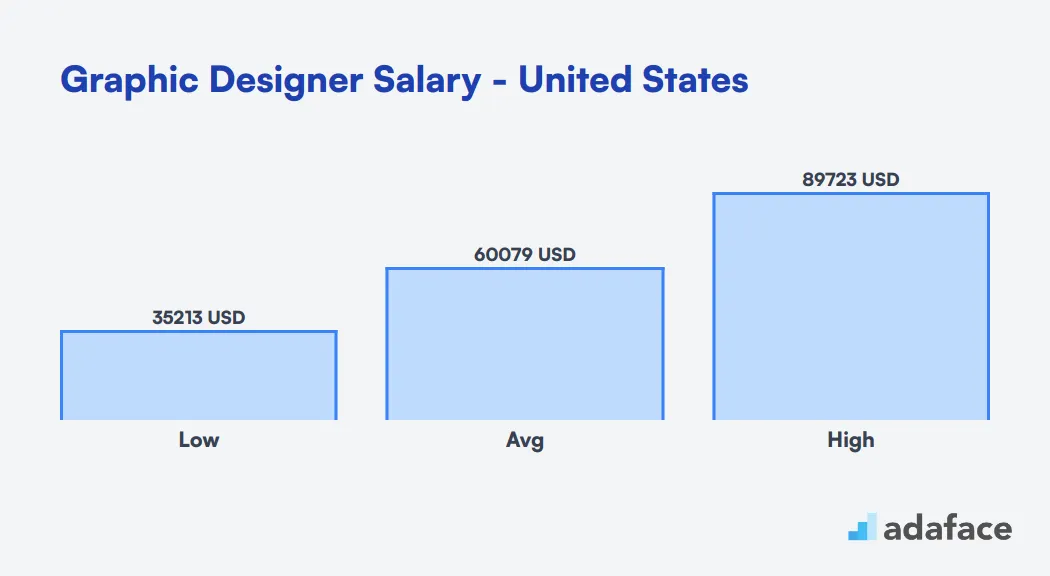
Graphic Designer Salary in Australia
The average salary for a graphic designer in Australia is approximately AUD 74,622. Salaries can vary significantly depending on location, with the lowest reported at around AUD 54,943 and the highest reaching up to AUD 96,560. Regions such as Sydney and Melbourne generally offer competitive salaries, while areas like Brisbane and Gold Coast tend to have lower averages.
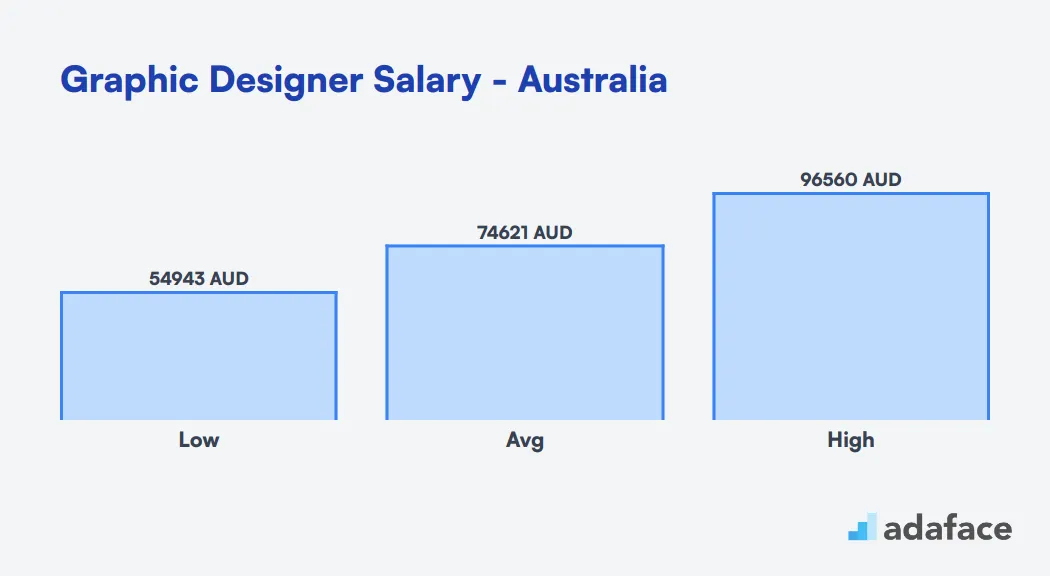
What's the difference between a Graphic Designer and a UI/UX Designer?
People often confuse graphic designers with UI/UX designers because both roles involve creativity and design. However, their focus areas and skill sets differ significantly.
Graphic designers concentrate on creating visual content that communicates messages effectively. They work on branding projects, crafting logos, posters, and illustrations. Their tools of choice often include Adobe Photoshop and Illustrator, with a strong emphasis on color theory and typography.
UI/UX designers, on the other hand, are concerned with the design and functionality of user interfaces. They focus on user interaction and usability, which involves creating prototypes, wireframes, and user flows. They collaborate closely with development and product teams and use tools like Sketch, Figma, and Adobe XD.
For more insights on the skills required for a graphic designer, you can explore this resource.
| Graphic Designer | UI/UX Designer | |
|---|---|---|
| College Degree | Graphic Design, Fine Arts | UI/UX Design, Interaction Design |
| Work Responsibilities | Create Visual Content, Branding | Design User Interfaces, User Experience Research |
| Design Tools | Adobe Photoshop, Illustrator | Sketch, Figma, Adobe XD |
| Focus | Visual Aesthetics, Graphics | User Interaction, Usability |
| Design Principles | Color Theory, Typography | User-Centered Design, Wireframing |
| Client Interaction | Marketing, Branding Teams | Development, Product Teams |
| Portfolio | Logos, Posters, Illustrations | Prototypes, Wireframes, User Flows |
| Keywords | Aesthetics, Creativity, Visuals | User Experience, Interaction, Usability |
What are the ranks of Graphic Designers?
The graphic design field has various ranks that often confuse recruiters, especially since some titles may seem interchangeable. Understanding these distinctions can help you target the right candidates for your team's needs.
• Junior Graphic Designer: This entry-level position is ideal for recent graduates or those new to the industry. Junior designers often work under the supervision of more experienced designers, focusing on executing design tasks and gaining experience.
• Graphic Designer: With a few years of experience, graphic designers handle projects independently. They create visual content for various media and may collaborate with other teams, requiring a solid understanding of design principles.
• Senior Graphic Designer: A senior graphic designer typically has extensive experience and is responsible for leading projects. They mentor junior designers and have a deeper understanding of client needs, providing strategic design solutions.
• Lead Graphic Designer: This role not only focuses on design but also on managing a team of designers. Lead designers oversee the creative process, ensure consistency across projects, and often interact directly with clients to align designs with their expectations.
• Creative Director: At the top of the hierarchy, creative directors are responsible for the overall vision and branding of a project or company. They guide the entire creative team, make high-level design decisions, and ensure that all output aligns with business objectives.
Hire the Best Graphic Designers for Your Team
Throughout this guide, we've explored the importance of hiring graphic designers, identified key skills and qualifications, and discussed how to craft effective job descriptions. We've also examined the best platforms to find candidates, important resume keywords, and ways to structure interviews.
If there's one thing to remember, it's that using accurate job descriptions and appropriate skill tests can significantly improve your hiring process. Consider employing assessments such as the Graphic Designer Assessment to ensure that you identify candidates with the right capabilities for your team.
Graphic Designer Aptitude Test
FAQs
Look for a combination of formal education in graphic design or a related field, a strong portfolio showcasing diverse projects, proficiency in industry-standard software like Adobe Creative Suite, and excellent communication skills.
Use skills assessment tests specific to graphic design, review their portfolio critically, and ask them to complete a small design task as part of the interview process.
Be cautious of candidates with outdated portfolios, an inability to explain their design decisions, lack of knowledge about current design trends, or poor communication skills.
While industry experience can be beneficial, a talented graphic designer with a diverse portfolio can often adapt to new industries. Focus on their ability to understand and visually communicate concepts relevant to your business.
Ask about their design process, how they handle feedback, their experience with brand guidelines, their favorite design tools, and how they stay updated with design trends. You can find more graphic designer interview questions here.
Review their portfolio for unique solutions to design problems, ask them to describe their creative process, and consider giving them a small design challenge to see how they approach a new project.
Look for candidates with strong communication skills, time management abilities, adaptability, teamwork capabilities, and a willingness to receive and incorporate feedback.

40 min skill tests.
No trick questions.
Accurate shortlisting.
We make it easy for you to find the best candidates in your pipeline with a 40 min skills test.
Try for freeRelated posts
Free resources



